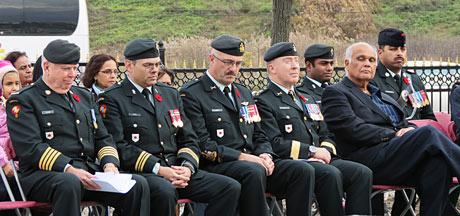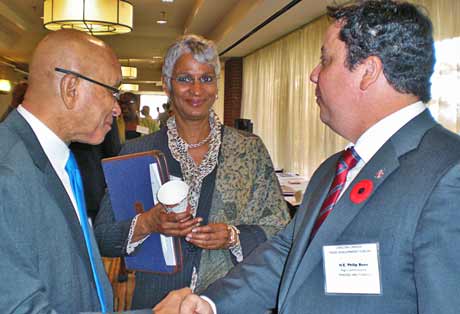Soldier Monument

Pix by Arti Panday
By Arti Panday
A sentiment of peace filled the afternoon as the Canadian Armed Forces joined with the Vishnu Mandir to commemorate Remembrance Day on November 20, 2011.
Emceed by Lieutenant Colonel Hari Panday, the ceremony took place inside the compound of Vishnu Mandir, near the Mahatma Gandhi Statue and Fallen Soldier Monument, where the Shanti Neketan (Peace Park) will be constructed.
"There was a lot of controversy about having the Gandhi statue and the Monument for the Fallen Soldier so close together when the monument was being built because Gandhi promoted non-violence and soldiers go to battle," said Dr. Budhendra Doobay, Head of the Vishnu Mandir. "The fact is, Gandhi stood for peace and Canadian soldiers stand for peace and peace alone."
The visit to the Vishnu Mandir/Voice of Vedas (VoV) included a tour of the Canadian Museum of Hindu Civilization before the ceremony which was followed by a short reception in the Anand Bhavan Senior's Residence. During the reception that took place immediately after the ceremony, a friend of Colonel Nudds, Marty Rosik, generously donated $10,000 to fund the construction of the Shanti Neketan.
Among the attendees were Lieutenant General Peter Devlin, Major Charles Jansen, Colonel Gerry Nudds, and author Jean Miso, who all took the opportunity to say a few words in remembrance of soldiers lost.
Lieutenant-General Devlin spoke after the children of the VoV Montessori School sang both the Canadian and Indian national anthems at the beginning of the ceremony.
"We take this solemn opportunity to remember those who served our country," Devlin said, "To be willing to give so much of themselves is the true definition of the word 'hero.'"
"The Final Inspection", a poem about a fallen soldier's conversation with God, was read by Colonel Nudds, and later Jean Miso sang her original song "We'll Never Forget," to pay homage to the soldiers who worked tirelessly for the peace of our country.
Following the reading of Flanders Field and a moment of silence, three wreaths were laid at the foot of the Fallen Soldier Monument, concluding the ceremony.

By William Doyle-Marshall
Caricom and Canadian Trade representatives are now planning for the fourth round of deliberations to conclude a new trade and investment agreement to replace the existing Caribcan Agreement that expires by year end. About 100 private sector officials from the Caricom region met with their Canadian counterparts earlier this month to examine each other's needs.
Diane Ablonczy, Minister of State for the Americas and Consular Affairs, in the Canadian Ministry of Foreign Affairs, congratulated forum organizers for bringing together a wide variety of businesses, business associations and officials from many Caribbean partners.
"What a tremendous opportunity for everyone here to make new friends and explore new opportunities for trade and investment. I can tell you there is a growing excitement about the Caribbean-Canada partnership," the Minister said.
Natasha Mustapha-Scott Chief Executive Officer Trinidad & Tobago Manufacturers' Association, Director of Caribbean Export Development Agency and Business Development Company in T&T, was relatively optimistic about the talks. She Chaired the Trade and Good Sector and

Rabinder Rambarran, Executive Director of the Private Sector Commission of Guyana has returned home convinced that there lots of opportunities for Caricom producers to get involved in areas like pawpaw, water melon, mangoes production. "Those are things we could probably grow," he said.

Rambarran identified the possibility of Canadian businesses working with their Caribbean counterparts to be greater producers of food for the region. Citing the pork industry, Rambarran noted Barbados imports $1.7 million U.S. per year for pork and pork products from Canada.
"Why the Canadians can't work with the Caribbean especially with Guyana where we have the vast amount of land?"
He also believes there are lots of other products Canadian companies are selling to the Caribbean that could be produced locally.
Elliott Page, Manager, Trade and Export Development, Caribbean Export Development Agency said at the end of the day what is needed is an agreement that will benefit the private sector on both sides (Caricom and Canada) and that both will utilize. For these negotiations to be successful, the private sector has a vital role to play, he stressed.
It (private sector) must offer advice of what its needs are to the negotiators. However Page's experience tells him that traditionally there is not a lot of trust between the public and private sectors. That perhaps needs to change, he advised.
Gary McFarlane, Operations Manager Grace Kennedy (Ontario) Inc. said the trade forum was important as his peers needed to meet as a group from the different industries. "It was good we had a chance to meet together as a group and discuss those concerns. A lot of them overlap, a lot of them are unique to certain industries but we got the opportunity to table it and we are hoping at the end of the day everything that was discussed will be taken into consideration when they are looking at renewing the agreement."
While Caribbean private sector administrators are anxious for an improved trade document, Minister Ablonczy admitted during the forum that it's time to break down trade barriers instead of building them. She recognized that around the world, nations are making it easier to do business with one another. That's because global economies are increasingly intertwined with supply chains, value chains becoming more transnational, she emphasized.